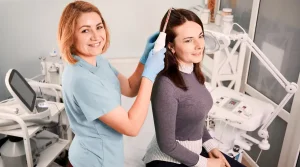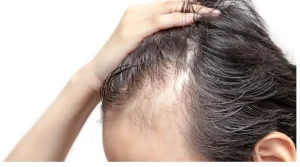Long-term nutritional deficits that go unrecognized or unaddressed can devastate one’s health. Various body parts can display symptoms alerting you to a medical problem. Whole-body well-being is dependent on being aware of these indicators of dietary inadequacies.
To better understand how your body is functioning and help you heal faster if something is wrong, learn these five indicators of nutritional deficiencies. These little warning signs can be easily corrected, saving you from more severe health issues in the future.
Symptom #1: Hair Loss and a Rash on the Body
Dietary deficits have long-term consequences for an individual’s well-being. In addition to a person’s physical health deteriorating, malnutrition negatively impacts their capacity to have satisfying work and social life.
Loss of hair and rashes on the face can harm one’s desire to feel confident in public and may be the first sign of a hormone imbalance or other physiological problem caused by a lack of nutrition.
Nutritional Deficiency
Loss of hair follicles (Alopecia) in regions throughout the head and body can occur when biotin levels are reduced. A scaly, red rash appears around the body’s orifices when a person has a shortage in biotin, which is also linked to an inflammatory skin condition. Biotin deficiency has been linked to chronic liver illness and should not be ignored in children, especially in their early years.
Recommended Treatment
The key to treating biotin insufficiency is figuring out what’s causing it first and taking steps to avoid it. Biotin deficiency can occur in people taking anticonvulsant or antibacterial medications. Biotin levels and overall health can be maintained and improved by avoiding antibiotics whenever possible.
Raw eggs decrease your capacity to metabolize biotin because they contain an avidin protein. Cooking eggs removes the avidin protein, which prevents biotin absorption from being affected. Excellent sources of biotin include nuts (e.g., almonds), sweet potatoes, raspberries, mushrooms, avocados, cauliflower, and wild salmon. These are very good for the formation of collagen in the body.
Symptom #2: Oral Health Problems
Healthy teeth and gums reflect your food, as numerous vitamins and minerals are crucial for safeguarding the mouth. Oral health problems can become more severe due to nutritional deficits.
Other people vulnerable to nutritional deficiencies in the oral cavity include those with gastrointestinal ailments, thyroiditis, autoimmune disorders, and those who take proton inhibitors.
Nutritional Deficiency
Research published in the Journal of American Dental Association (JADA) dictates that nutritional deficiencies in B vitamins, minerals, iron, and zinc have been linked to poor dental health.
Recommended Treatment
A higher risk of infection and a weaker immune system can result from nutritional deficits in any of these nutrients. Unless you have dietary restrictions, wild salmon and tuna, free-range chicken, and organic and free-range eggs are excellent protein sources high in iron, zinc, and B vitamins.
Foods high in phytates, such as grains, legumes, and nuts, should be avoided. These phytic acids interfere with the absorption of minerals like zinc and iron by binding to them. Soaking and sprouting nuts and seeds eliminate phytic acids and increase the nutrients’ bioavailability. Use fermented foods rich in B vitamins, beneficial bacteria, and enzymes to aid in the digestion of your food.
Increase your vitamin C-rich veggies to raise your body’s ability to absorb iron. Some anti-inflammatory foods include kale, broccoli, cruciferous vegetables, tomatoes, red bell peppers, and citrus fruits such as lemons and limes. Avocados and dark leafy green vegetables, in particular, are critical sources of B vitamins for anyone on a special diet.
Symptom #3: Leg Cramps
Leg cramps, flat feet, and stabbing pain in the toes may indicate a nutritional deficiency that interferes with the proper functioning of other ions in your system.
You may be simply perspiring more frequently than usual, increasing electrolyte loss. In any case, cramps should be handled as a symptom, regardless of how long they last.
Nutritional Deficiency
Magnesium deficiency is among the most prevalent nutritional deficiencies. In addition to its role as an electrolyte in physiological fluids and support for good nerve function in the body, magnesium is an essential mineral for human health. Magnesium deficiency can lead to various health issues, including calcium ion channel imbalances.
There may also be a problem with calcium absorption or insufficiency. Calcium aids in muscular contraction and nerve impulse generation. Your calcium deficit may be caused by a lack of vitamin D, which regulates and enhances calcium absorption. Magnesium, potassium, and calcium deficiencies should not be ruled out because they all play a role in avoiding muscle cramps.
Recommended Treatment
Avocados, pumpkin seeds, and unsweetened cocoa are all excellent sources of magnesium, while Brazil nuts and almonds are also high in magnesium and potassium. Fermented foods, such as kefir, yogurt, and milk from 100% grass-fed animals, can provide calcium and magnesium in combination with a healthy vitamin D3 to regulate calcium absorption. Potassium is abundant in coconut water and coconut water kefir.
A number of plant compounds are naturally antispasmodic, which can help alleviate symptoms such as muscle pain and spasms in the joints.
Herbs like lavender, chamomile, rosemary, and cypress are all excellent options. Use them as a foot soak, a home diffuser, or massage oil for your legs.
Symptom #4: Acne, Rashes, & Blemishes
Nutrient deficiency has been linked to several skin disorders. It’s not uncommon for people with skin issues such as severe acne, eczema, or skin pigmentation disorders to use skin moisturizers or anti-inflammatory medicines to alleviate their symptoms.
Finding a cure is much easier if you know what’s causing it. Learning if your skin problems are caused by inadequate nutrition in your diet may be the first step in resolving them. Many people with these illnesses have shortages in fat-soluble nutrients such as Vitamin A, Vitamin D, and Vitamin E. Skin health depends on omega-three fatty acids and gamma linoleic acid (GLA).
Grass-fed butter and vegetables are firm in vitamin A and E, so make sure to eat plenty of those every day and take a high-quality omega-3 supplement with GLA added to it.
Nutritional Deficiency
Vitamin A deficiency impacts more than half of the world. In contrast, vitamin D deficiency is almost an epidemic since 90% of the population is deficient in the mineral.
Acne can be exacerbated by a lack of the long-chain omega-3 fatty acids EPA and DHA, which are commonly insufficient in the diets of the majority of individuals.
Recommended Treatment
Organic eggs, dark green vegetables, carotenoid-rich veggies like carrots and sweet potatoes, and milk from 100 percent grass-fed cows are also sources of vitamin A-rich foods.
Even though the sun is the primary source of skin-derived vitamin D, grass-fed butter contains a significant amount of this nutrient. Cod liver oil is a good source of vitamin A and vitamin D, so you might want to add some to your diet. Keep sugar and other triggers like dairy proteins and gluten out of your diet.
Purified fish oil is an excellent source of long-chain omega-three fatty acids EPA and DHA. Add probiotics into your diet for gut health, and use coconut oil and lavender essential oils on your face for a more nourished microbiota and less inflammation.
Symptom #5: Unusual Feelings from the Hands & Feet
Are you itching in your toes? Is there a tingling sensation in your hands or numbness in your feet? There may be something more serious going on than these seemingly minor symptoms let on. Even if symptoms take a while to appear, as time passes, they get more severe and can have profound effects on one’s health.
Nutritional Deficiency
For almost a century, researchers have been trying to understand the multiple metabolic roles that vitamin B12 plays in supporting health, which was initially discovered in 1849. As part of a chain reaction that governs nerve activity, vitamin B12 helps to synthesize DNA and prevents certain amino acids, such as homocysteine, from building up to hazardous amounts.
As a result of its complex interactions with other nutrients, vitamin B6 is also involved in the transmission of nerve impulses. Vitamin B6 deficiency can lead to nerve damage if left untreated for an extended period.
Recommended Treatment
Foods rich in B vitamins, such as meat, eggs, dairy, and poultry, are predominantly of animal origin. As a result, vegans and vegetarians are more likely to suffer from vitamin B insufficiency than the average person. Even though animal products like meat and green leafy vegetables don’t contain vitamin B12 since it is bonded to protein, it does contain vitamin B6.
Why Nutritional Deficit Happens
Deficiencies in nutrients can occur to a variety of causes. Micronutrient deficiency and high sugar and processed food intake are among the most common causes of obesity in the United States. Leaky gut syndrome and low stomach acidity are two less well-known factors contributing to poor nutrient absorption.
Deficiencies in essential nutrients might result from a lack of proper blood sugar control and long-term stress. All of us have experienced one or more of these circumstances at some point in our lives, and, probably, you’re now dealing with one of them. Overall, it is essential to remember the significance of routine appointments with a doctor to ensure that no malnutrition is happening.





